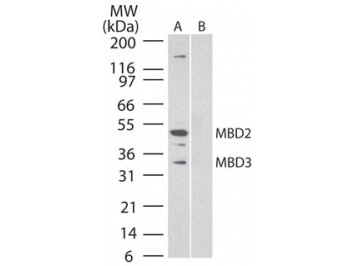Datasheet is currently unavailable. Try again or CONTACT US
MBD3 Antibody
Mouse Monoclonal 106B691 IgG1 kappa
200-301-H92
100 µg
Liquid
WB, IHC, IF, FC, ChIP
Human
Mouse
This product is discontinued
Product Details
Anti-MBD3 (MOUSE) Monoclonal Antibody - 200-301-H92
Methyl-CpG-binding domain protein 3, Methyl-CpG-binding protein MBD3
Mouse
Monoclonal
IgG1
Target Details
MBD3 - View All MBD3 Products
Human
Conjugated Peptide
MBD3 Antibody was produced in mice prepared by repeated immunizations with human MBD3 along the internal region of the protein.
Anti-MBD3 Antibody was purified by Protein G chromatography. A BLAST analysis was used to suggest cross-reactivity with Anti-MBD3 from human based on 100% homology with the immunizing sequence. Cross-reactivity with Anti-MBD3 from other sources has not been determined.
Application Details
ChIP, FC, IF, IHC, WB
Anti-MBD3 Antibody is tested for use by WB, ChIP, Flow, IHC, IHC-P, and ICC/IF. Expect a band approximately 33 kDa on specific lysates. Specific conditions for reactivity should be optimized by the end user.
Formulation
1.0 mg/mL by UV absorbance at 280 nm
0.02 M Potassium Phosphate, 0.15 M Sodium Chloride, pH 7.2
0.05% (w/v) Sodium Azide
0.05% BSA
Shipping & Handling
Dry Ice
Store vial at -20° C prior to opening. Aliquot contents and freeze at -20° C or below for extended storage. Avoid cycles of freezing and thawing. Centrifuge product if not completely clear after standing at room temperature. This product is stable for several weeks at 4° C as an undiluted liquid. Dilute only prior to immediate use.
Expiration date is one (1) year from date of receipt.
Anti-MBD3 Antibody detects human MBD3. DNA methylation, or the addition of methyl groups to cytosine bases in the dinucleotide CpG, is imperative to proper development and regulates gene expression. The methylation pattern involves the enzymatic processes of methylation and demethylation. The demethylation enzyme was recently found to be a mammalian protein, which exhibits demethylase activity associated to a methyl-CpG-binding domain (MBD). The enzyme is able to revert methylated cytosine bases to cytosines within the particular dinucleotide sequence mdCpdG by catalyzing the cleaving of the methyl group as methanol. MeCP2 and MBD1 (PCM1) are first found to repress transcription by binding specifically to methylated DNA. MBD2 and MBD4 (also known as MED1) were later found to colocalize with foci of heavily methylated satellite DNA and believed to mediate the biological functions of the methylation signal. Surprisingly, MBD3 does not bind methylated DNA both in vivo and in vitro. MBD1, MBD2, MBD3, and MBD4 are found to be expressed in somatic tissues, but the expression of MBD1 and MBD2 is reduced or absent in embryonic stem cells, which are known to be deficient in MeCP1 activity. MBD4 have homology to bacterial base excision repair DNA N-glycosylases/lyases. In some microsatellite unstable tumors MBD4 is mutated at an exonic polynucleotide tract. Anti-MBD3 Antibody is ideal for investigators involved in Epigenetic, DNA damage and repair, and cell cycle protein research.
This product is for research use only and is not intended for therapeutic or diagnostic applications. Please contact a technical service representative for more information. All products of animal origin manufactured by Rockland Immunochemicals are derived from starting materials of North American origin. Collection was performed in United States Department of Agriculture (USDA) inspected facilities and all materials have been inspected and certified to be free of disease and suitable for exportation. All properties listed are typical characteristics and are not specifications. All suggestions and data are offered in good faith but without guarantee as conditions and methods of use of our products are beyond our control. All claims must be made within 30 days following the date of delivery. The prospective user must determine the suitability of our materials before adopting them on a commercial scale. Suggested uses of our products are not recommendations to use our products in violation of any patent or as a license under any patent of Rockland Immunochemicals, Inc. If you require a commercial license to use this material and do not have one, then return this material, unopened to: Rockland Inc., P.O. BOX 5199, Limerick, Pennsylvania, USA.

